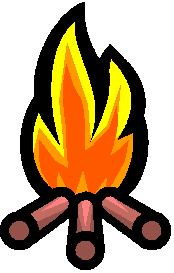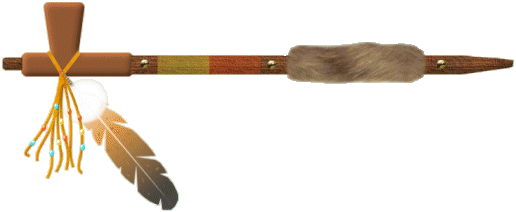One day when many of the men were out on hunts and the women all were
engaged in their usual camp duties, cooking the noonday meal and
working hides and making beadwork, as they always were when not on the
trail, --suddenly volley on volley of musketry came into their tepees
killing old men, women and children that were at play all about.

In
terror, the women survivors caught up the little ones and clasped their
babes to their breasts and ran screaming for safety. They could not
tell what was happening or where to go, and the early moments of the
attack were ones of terrified confusion. Then the soldiers came in view
up stream. The women then ran down the river, only to learn that Custer
and his troops had been seen to approach in that direction. They turned
to the west and tried to reach the hills in the mad effort to escape
the deadly range of the Reno carbines.
Crazy Horse and Flying
Hawk happened to be near when the heartless attack was begun.
Instantly, they grabbed their guns and mounted ponies with the warcry
to their friends to come. As they raced up towards the soldiers the
troopers whirled their horses and retreated in complete rout into the
timber that lined the stream here on the western border.
The
Indians came up to the soldiers as they plunged into the stream,
mounted or on foot, in the mad struggle to get across and up the steep
bank opposite to where the wagon-train waited on the hill. It was a
bloody revenge the red men took at the crossing. Crazy Horse and Flying
Hawk were in the thick of the fight; they pulled several soldiers from
their horses and knocked them dead with war clubs; they shot them as
they tried to crawl up the slippery bank on hands and knees. Several of
the wounded were drowned. Those that escaped over the river got up into
the hill and dug holes and stayed in them until the fighting was all
over and the Indians had left the battlefield.
There were three
detachments, (bunches, the chief said) along the ridge where Custer had
gone north toward the lower end of the valley where the greater number
of villages were, Crazy Horse with Flying Hawk quickly gained a
position in the rear of the first body of troops by following a ravine
to the ridge where they got within range. Here Crazy Horse dismounted
and handed the rein to Flying Hawk, and killed the soldiers as fast as
he could work his repeater. The chief indicated the speed with which
these troopers fell, by swaying his body from side to side. The few
that got away from the deadly aim of Crazy Horse ran on along the ridge
to others who were trying to make a stand. Here they were followed by
the enraged red men whose wives and children had been so mercilessly
slaughtered but a few moments before,--and they received no quarter.
This
bunch was nearly all killed before the few stragglers realized they
were being annihilated, and ran along the Custer trail looking for
relief from him.
But now there was fast and furious activity on the
part of the main villages where the wails of the frantic women drove
them to frenzy. The occasion was one born of desperation; the sight of
dead and maimed,--the agonizing shreiks of wives and loving
daughters,--the pallid lips of dead and dying children and the doleful
death-songs all about them made of the naturally friendly red men, an
army that was invincible.
With Crazy Horse and his friends
driving the remnant of the first attackers along the ridge were Two
Moon and his men of the celebrated Cheyennes; with Gall and Lame Deer
at the front with their respective bands of Sioux aided by the ravines,
quickly and silently surrounded the Custer Division on the hill. The
death yell sounded and the battle began. The Indians with their hideous
war cry raced in a circle with carbines and bows and arrows, and
tomahawks, and war clubs and knives made short work of the blue coats.
The
din and dust and smoke, the chief said, was terrifying to the troops
and they dismounted, their frightened horses running down the ravines,
were caught by the squaws.
The whole fight lasted but an hour.
As the smoke cleared away a little, a soldier was observed running away
toward the east. Quickly Crazy Horse mounted his pony and got him
within a half mile of where Custer and more than two hundred of his
soldiers lay dead in the hot sun.
The chief said, "We did not
mutilate the bodies,--only took their guns, watches, rings and money.
We took some of the clothes from them".
With the collection of
the arms and other valuables, the Indians returned to their desolated
camp and joined in mourning for their dead ones,--and prepared for
breaking camp to bury the dead, and once more seek a place where they
might be unmolested by the hated government soldiers.
There was
no sign of boasting; no resentment. It was merely an incident in his
long active life on the frontier,--a life in which he had little relief
from pursuit and persecution by the army of the government. To him it
was only what he might expect from a people which had violated every
promise to him and to his people,--who had robbed and cheated them from
the remotest generations.
The old man sighed with relief when he was not pressed to talk more about It.

